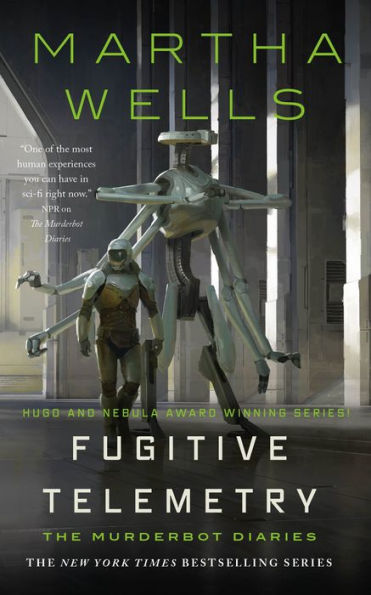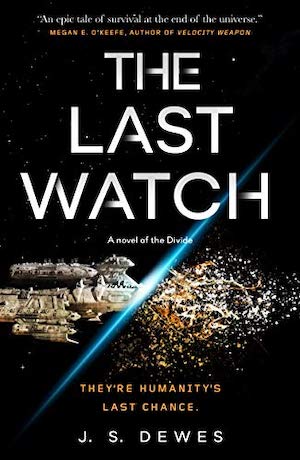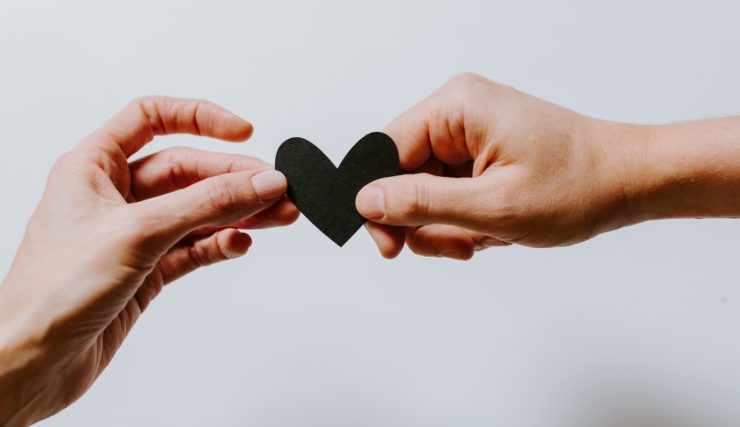Don’t get me wrong, I love a good ship as much as the next fangirl. But the most rewarding relationships in my adult life have been those rooted in platonic love. (Outside my husband, who still counts—we’re first and foremost BFFs after all, *hi Dave*.) And yet, these meaningful platonic relationships I’ve built my entire social framework around are conspicuously missing from most of the media I consume.
(Disclaimer: Platonic relationships come in all flavors, but for the purposes of this rant article I’ll be focusing on: SFF, Male/Female, non-familial, significant story/character development impact.)
Why No Love For Platonic Love?
The concept of “shipping” has firmly established itself as a staple of fandom culture, which is itself becoming intrinsically tied to genre fiction and SFF in particular. And again—I get it, I really do, I have plenty of ride-or-die OTPs of my own: Lexa & Clarke (The 100), Adama & Roslin (Battlestar Galactica), Hawke & Anders (Dragon Age 2), Fitz & Simmons (Agents of SHIELD), the list goes on.
However, romance and friendship aren’t mutually exclusive endeavors—a fact society only seems ready to accept when that friendship serves as a precursor to an eventual romance.
I’m here to rally against that assumption, and I think we can begin in a couple ways. First and foremost by not pitting romantic love and platonic love against each other. These two types of relationships can—and should—coexist in any well-rounded narrative. However so much of the time, the platonic side gets left behind, whether due to inherent author biases, reader and genre expectations, or both.
Additionally, instead of relegating these friendships to subplots or backstories, we can make a concerted effort to place them at the forefront and show just how impactful platonic relationships can be in the lives of our fictional characters. The strongest relationships are those that stem from a place of mutual respect, and this is a dominion in which friendships shine. I’ll never tire of seeing two characters treating each other as equals, understanding each another’s strengths and weaknesses, and supporting each other unconditionally, without any expectation of something “more.”
A romantic relationship is so often treated as a thing won or lost—a goal to be attained by one or both parties. This not only has the potential to corrode the roots of the romance itself, but can have the (rather harmful) consequence of undermining and devaluing the “worth” of “only” a friendship—placing it on a lower tier of relationship status. (While we’re on the topic, I’d love to see a reframing of language such as “just friends” or “friend-zone” which exacerbate this issue by implying a lesser value on the concept of friendship as a whole.)
Normalizing these relationships not only eases the social burden on people like me who just want to have close friendships with the people she cares about (who happen to be men) without having to field ongoing suspicion and condescension, but also opens the doors for the future. Just like with any stigma, by conscientiously reflecting in our literature what we already know to be true in real life, we can help break down the false assumptions society has built up around opposite-sex relationships.
And besides, platonic love opens a floodgate of possibilities for unique relationship dynamics in storytelling. My personal favorite formula is when the two characters are somehow both opposites, and yet cut from the same cloth. At their core, they’re the same—made from the same cosmic material, if you will—but their upbringing, experiences, relationships, and life circumstances have put them on very different paths. When the story brings them together, they just click; it’s like two long lost pieces of a whole coming together—no kissing required.
Examples, Please?
Sure! Here are my top four favorite M/F platonic soulmate pairs! (And yes, only four because I couldn’t find even ONE more that met the criteria laid out in the disclaimer (and on which I knew enough to speak articulately).)
Dutch & Johnny (Killjoys)
These two are the premier example of platonic love I’ve seen to date, and the standard to which I hold all other friendships in media. It’s impressive alone for its sheer duration, as well as the fact that there’s never once a lingering subplot or undertone of “will they/won’t they.” (Though I’d ask you please ignore the pointless false-memory-marriage subplot from the final season.)
By establishing early on that these two are in it for the long haul, we get a fantastic portrayal of how a true, perennial platonic friendship looks and feels, complete with its ups and downs.
But mostly ups—not only because Killjoys is an overwhelmingly optimistic adventure romp, but because Dutch and Johnny already know each other, and have a functional, long-standing, brimming over with true love friendship from the get-go. It helps that they possess a natural chemistry that makes you absolutely love the crap out of both of them, and the unconditional way in which they actively support and protect one another is not only the backbone of the entire show, but is downright heartwarming and truly refreshing to watch.
Clarke & Bellamy (The 100)
Bellarke fans just sit down please because the ship isn’t canon (in the show at least) and I’m so here for this delicious post-apocalyptic BFF action.
Where Dutch and Johnny are a great fit but actually intrinsically quite different, Clarke and Bellamy are very much in the aforementioned category of “cut from the same cloth.” That mixed with constant struggles of evolving survival needs and shifts in leadership make complicated scaffolding for this Gordian knot of a relationship. These are two who—under any circumstances other than “dystopian post-apocalyptic wasteland survival”—would likely not have even been friends, never mind (platonic) soulmates. Theirs is a trust born of (hard-earned) mutual respect, and thereby a willingness to accept their own shortcomings and understand when to step back and let the other take the reins.
A unique feature to mention here is how very slow-burn of a vibe they have. They take their sweet time finding their footing together, and even once you think things are finally settled, complications abound. They relapse into frenemy or even enemy territory multiple times—but those rough patches and backslides are just as critical to feature as the positive bits. You can’t craft any relationship that feels truly realistic and earned without throwing a few spanners in the works.
Damon & Bonnie (The Vampire Diaries)
This one might get me killed too, but I’m here to firmly support the writers’ decision to remain platonic. These two Very Troubled Souls™ manage to dredge up a striking platonic relationship out of the weeds of deep shared trauma. Their natural chemistry effortlessly morphs from enemies to frenemies to #FriendshipGoals in a matter of a mere handful of well-executed montages. After that, the two trade sacrifices like Halloween candy, but the true headliner is in how they manage to challenge one another—intentionally or not—to become better people. Damon changes Bonnie for the better, and Bonnie changes Damon for the better (in a relative sense given the morality spectrum of TVD), and in the end that’s—to continue with my weird candy analogy—the key ingredient in the sweet gooey center of platonic love.
Murderbot & Mensah (The Murderbot Diaries)
THESE. TWO. (I know, I know—Murderbot is agender—but I’m counting it anyway.)
The key salience here that’s not seen often and thus why I wanted to include it: Murderbot’s not expected (by the narrative or Mensah) to sacrifice its happiness or well-being in support of the relationship. It’s important to Mensah that Murderbot choose its own path, regardless of her own wants or needs, and it’s perfectly fine for Murderbot to be “““selfish””” in that respect, and it doesn’t inherently undermine the strength of the relationship. Refreshing AF.
Buy the Book


Fugitive Telemetry
Honorable mentions:
- Black Widow & Hawkeye (The MCU version, at least.)
- Arya Stark & Sandor Clegane (Game of Thrones — It takes a minute, but they get there.)
- FemShep & Garrus (Mass Effect — They’re platonic BFFs and I’ll go down with this lack-of-ship, don’t @ me.)
Who Are You to Judge?
Well, no one probably, but it’s shameless plug time.
I gleefully discovery-wrote my way through my debut novel The Last Watch, but one of the few things I knew before I even put a single word on the page was that I wanted to use it first and foremost to showcase a strong, healthy, overwhelmingly positive M/F platonic relationship—one not without its struggles, mind you, but one that starts from a good place and only has the best intentions along the way.
Enter main characters Adequin Rake and Cavalon Mercer, tired spaceship commander and disowned trash prince respectively. Before I’d even fully realized it, this relationship quickly became more than just the emotional core of the story, it became the impetus of the plot itself. Without getting into spoilers, let’s just say there would be no “big picture” conflict if these two hadn’t met (an ironic twist of fate used to gleefully taunt the villain later in the series.
And I ship Adequin and Cavalon (hard)—just platonically. When I first started drafting, I’d scramble back to my computer every day to write because I couldn’t wait to see the people these two would become now that they met, and as the series progresses that excitement only grows.
Though they remain the focus of my zeal, I’ve also made a concerted effort to avoid turning them into a “token” by showcasing multiple platonic relationships of all different flavors. Both main characters build strong nonromantic relationships with others throughout the series, and each one is an opportunity for me to showcase a different way platonic love can look and feel, and it’s loads of fun to write.
Please inform me of any well-constructed, not-romantic-ever-once platonic loves I’ve missed in fiction, because I need more in my life please.
Buy the Book


The Last Watch
J.S. Dewes is an author, cinematographer, and video editor with a degree in film production from Columbia College Chicago. Jenny cut her narrative teeth writing scripts for award-winning feature films and shorts which have screened at festivals and conventions all across the United States. A creative a heart, she enjoys video games, drawing, photography, graphic design, Pinterest, and all things visual.










